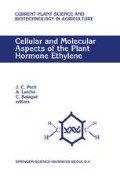Abstract
Genes involved in changes in colour, flavour, texture, and aroma are expressed during ripening of fleshy fruits. In tomato, and other climacteric fruits, ethylene synthesised at the outset of ripening is involved in regulating expression of some of these ripening genes. Many ripening-related mRNAs have been cloned and several, including polygalacturonase, pectinesterase, ACC synthase, ethyleneforming enzyme (EFE), and phytoene synthase have been identified and sequenced (for review see Gray et al., 1992). We have used an antisense-RNA strategy, developed originally for the polygalacturonase gene (Smith et al., 1988, 1990) to identify cDNA and genomic clones for EFE (Hamilton et al., 1990, 1991). Reducing EFE expression in transgenic tomatoes inhibits ethylene synthesis and slows ripening and over-ripening of fruits. Ripening can be accelerated by adding ethylene to detached fruit. In the EFEantisense plants, leaf senescence is delayed and wound-ethylene synthesis is also reduced. Inhibiting ethylene synthesis caused a reduction in carotenoid production in fruit, which was associated with reduced expression of phytoene synthase required for the production of β-carotene and lycopene (Bird et al., 1991). A naturally occurring tomato mutant deficient in carotenoid production has been characterised and shown to contain a mutation in the phytoene synthesis gene expressed in fruit. Constitutive over-expression of a wild-type sequence in mutant transgenic plants restores carotenoid production in ripening tomatoes and leads to unscheduled carotenoid synthesis in other cell types. The potential for using sense and antisense genes to identify and assign functions to ripening genes and to alter the physiology and biochemistry of fruits is discussed.
Access this chapter
Tax calculation will be finalised at checkout
Purchases are for personal use only
Preview
Unable to display preview. Download preview PDF.
References
Armstrong GA, Alberti M, Hearst JE (1990). ‘Conserved enzymes mediate the early reactions of carotenoid biosynthesis in nonphotosynthetic and photosynthetic prokaryotes.’ Proc Natl Acad Sci USA, 87: 9975–9979.
Bird CR, Ray JA, Fletcher JD, Boniwell JM, Bird AS, Teulieres C, Blain I, Bromley PM, Schuch W (1991). ‘Using antisense RNA to study gene function: Inhibition of carotenoid biosynthesis in transgenic tomatoes.’ Bio-technology 9: 635–639.
Darby LA, Ritchie DB, Taylor IB (1978). ‘Isogenic lines of the tomato ’Ailsa Craig’.’ Glasshouse Crops Res Ann Rep 1977: 168–184.
Gray JE, Picton S,Shabbeer J, Schuch W, Grierson D (1992). ‘Molecular biology of fruit ripening and its manipulation with antisense genes’. Plant Molecular Biology 19: 69–87.
Hall LN, Tucker GA, Smith CJS, Watson CF, Seymour GB, Bundick Y, Boniwell JM, Fletcher JD, Ray JA, Schuch W, Bird CR, Grierson D (1993). ‘Antisense inhibition of pectin esterase gene expression in transgenic tomatoes.’ The Plant Journal. In Press.
Hamilton AJ, Lycett GW, Grierson D (1990). ‘Antisense gene that inhibits synthesis of the hormone ethylene in transgenic plants.’ Nature 346: 284–287.
Hamilton AJ, Bouzayen M, Grierson D (1991). ‘Identification of a tomato gene for the ethylene forming enzyme by expression in yeast.’ Proc Natl Acad Sci USA 88: 7434–7437.
Jenkins JA, MacKinney G (1955). ‘Carotenoids of the apricot tomato and its hybrids with yellow and tangerine.’ Genetics 40: 715–720.
Oeller PW, Wong LM, Taylor LP, Pike DA, Theologis A (1991). ‘Reversible inhibition of tomato fruit senescence by antisense 1-aminocyclopropane-l-carboxylate synthase.’ Science 254: 437–439.
Picton S, Barton SL, Bouzayen M, Hamilton A Grierson D (1993). ‘Altered fruit ripening and leaf senescence in tomatoes expressing an antisense ethylene-forming enzyme transgene.’ The Plant Journal. In press
Sheehy RE, Kramer M, Hiatt WR (1988). ‘Reduction of polygalacturonase activity in tomato fruit by antisense RNA.’ Proc Natl Acad Sci USA 85: 8805–8809.
Smith CJS, Watson CF, Ray J, Bird CR, Morris PC, Schuch W and Grierson D (1988). ‘Antisense RNA inhibition of polygalacturonase gene expression in transgenic tomatoes.’ Nature 334: 724–726.
Smith CJS, Watson CF, Bird CR, Ray J, Schuch W, Grierson D (1990a). ‘Expression of a truncated tomato polygalacturonase gene inhibits expression of the endogenous gene in transgenic plants.’ Mol Gen Genet 224: 477–481.
Smith CJS, Watson CF, Morris PC, Bird CR, Seymour GB, Gray JE, Arnold C, Tucker GA, Schuch W, Harding S, Grierson D (1990b). ‘Inheritance and effect on ripening of antisense polygalacturonase genes in transgenic tomatoes.’ Plant Mol Biol 14: 369–379.
Tieman DM, Harriman RW, Ramamohan G, Handa AK (1992). ‘An antisense pectin methylesterase gene alters pectin chemistry and soluble solids in tomato fruit.’ The Plant Cell 4: 667–679.
Author information
Authors and Affiliations
Editor information
Editors and Affiliations
Rights and permissions
Copyright information
© 1993 Springer Science+Business Media Dordrecht
About this chapter
Cite this chapter
Gray, J.E. et al. (1993). Altered Gene Expression, Leaf Senescence, and Fruit Ripening by Inhibiting Ethylene Synthesis with EFE-Antisense Genes. In: Pech, J.C., Latché, A., Balagué, C. (eds) Cellular and Molecular Aspects of the Plant Hormone Ethylene. Current Plant Science and Biotechnology in Agriculture, vol 16. Springer, Dordrecht. https://doi.org/10.1007/978-94-017-1003-9_15
Download citation
DOI: https://doi.org/10.1007/978-94-017-1003-9_15
Publisher Name: Springer, Dordrecht
Print ISBN: 978-90-481-4249-1
Online ISBN: 978-94-017-1003-9
eBook Packages: Springer Book Archive

